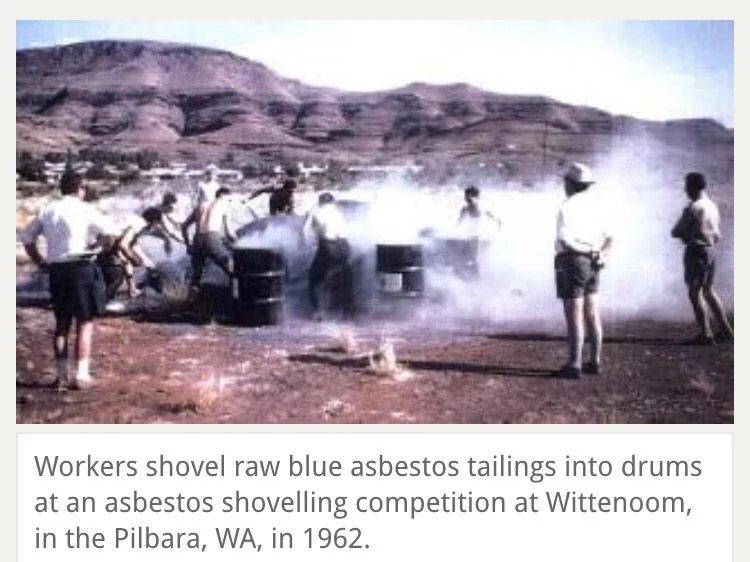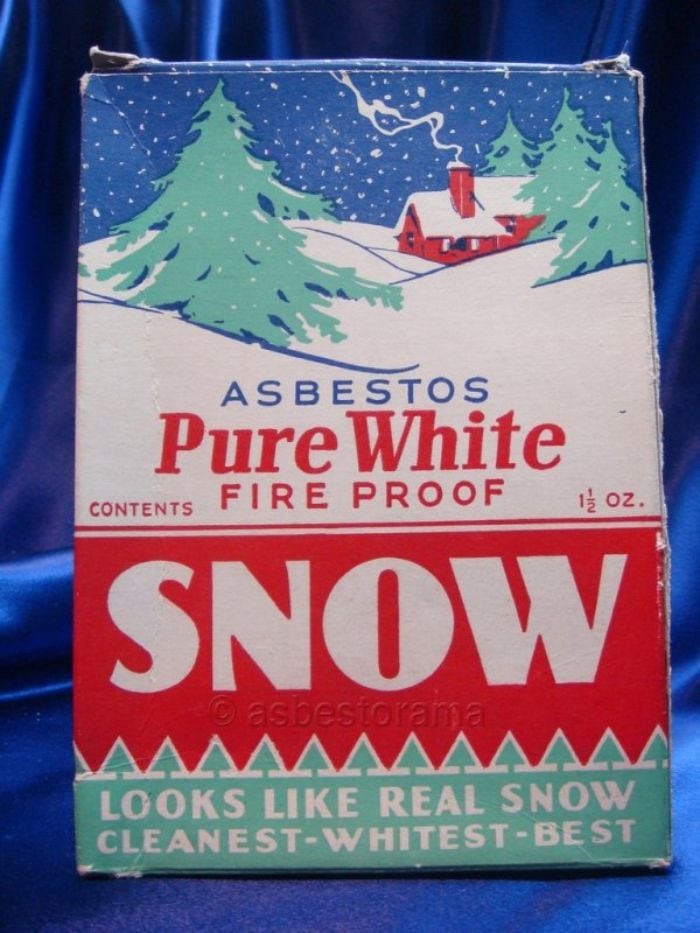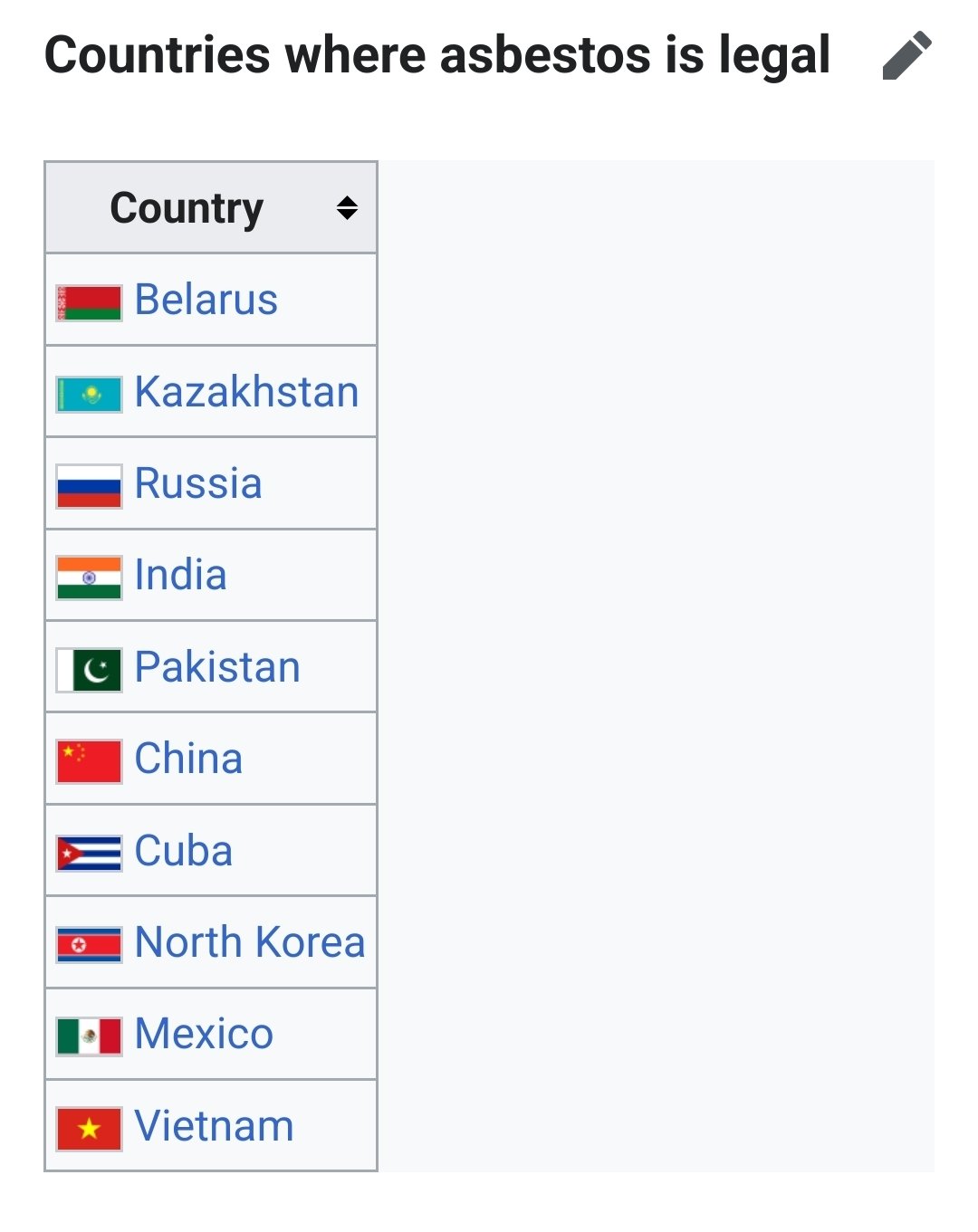It is a fantastically useful material, except for all the mesothelioma.
Seriously, except for the horrific issues with the stuff, it would be an essential material for various applications.
Its resistance to fire, heat transfer, etc would do wonders for insulation and construction.
Makes me wonder if it could be treated in some way to make it not-so-inhalable. Though maybe we have better synthetic alternatives by now.
As I’ve understood it, the problem is primarily for the people having to manufacture products using it, and at rest it’s supposed to be inert.
Except that people don’t always recognize it and end up drilling holes in it or sawing through it
This is probably how I’ll die tbh
Don’t forget about when it’s time to un-make it.
Tearing down old building or tiles containing asbestos is also a huge issue.
So many people were exposed to asbestos dust in New York when the world trade centre towers were destroyed by terrorists
Yep. Probably like 40,000 people.
lol terrorists. I see them as victims in a war this country started. So by proxy, we’re the terrorists. What a stupid fucking word!
I’m calling them by their methods not their politics
One is a terrorist when one attempts to alter a country by attacks attempting to terrorise the population
You do recall that they destroyed office buildings with airliners
If you kill several thousand people to make a point you’re a terrorist.
The end.
It’s supposed to be it tends to get brittle and fracture creating airborne shards that you can breath in but your body can’t break down and that continuously damages the cells leading to cancer.
Any time you disturb it theres a problem
TIL, I’m an asbestos.
Doesn’t burn, really hard to wear out, you can just dig it out of the ground, easy to shape and repair.
Except it kills people, and it hurts the whole time they’re dying.
Mother Gaia does a little trolling
This is how you know the universe hates us.
The universe owes none of us anything. We stick our noses into everything and some things aren’t good for us
This one is only really bad because the asbestos companies kept it secret when they found their product killed those exposed to it.
“If you or a loved one have been diagnosed with mesothelioma, you may be entitled to compensation…”
We are in Australia. The company that mined the stuff was found negligent as they kept selling it for decades after they knew it was deadly dangerous
I also hear that so many times thanks to one of the Brain Blaze (on YouTube) editors
The same shit happened in Spain
The company that founded Wittenoom?
CSR, if I recall correctly
That and lead in paint and gasoline all worked amazingly.
Lead in gasoline was a stop-gap solution. If I remember correctly , it was added because we didn’t have the technology at the time to refine gas sufficiently to get the octane levels necessary to prevent pre-ignition of fuel (which causes rod knock) at a reasonable cost. Tetraethyl lead effectively increased the octane level/resistance to pre-ignition. As a side benefit, the lead slightly lubricated the valves and valve seats so that they lasted for tens of thousands of miles, instead of needing to be reground every few thousand miles.
It was a stupid stop-gap though, esp. since the dangers of lead were well known by then.
You’re mostly correct. It was an additive to raise the octane rating and did lubricate. However, it wasn’t a gas refinement issue that caused the need. An octane boosting additive has been needed ever since, right up to today. Now the octane booster used is ethanol, mostly.
Race cars and many airplanes still use lead. We’re still making people dumber. Just at a lesser scale.
If you want a sad rabbithole, look at the cancer rates around small airports, which are often much closer to where people live.
While it’s no consolation to these current people, they are trying to make the switch to lead-free aviation fuel. It’s partly a regulatory nightmare, and partly a genuine safety challenge; mandating a fuel change in aviation without adequate research and understanding can result in unexpected engine malfunctions.
unexpected engine malfunctions
On the other side of that is the known problems that lead causes. Seems to me that the best solution is to give everyone a cut off point, and say, hey, when we hit this point, you’re going to have to retire that engine, and get one that’s known to be good with lead-free avgas. Sure, it’s a cost, but that’s why you give people time to prepare.
They have! 2030.
I’m not sure if it’s a mandate, or a goal, but it’s there.
You can absolutely get high octane ethanol-free gas; there’s a place near me that sells it. I know that a lot of people with motorcycles use it, because inline four cylinder motorcycle engines tend to be high compression, and motorcycle people tend to be almost religious about not using ethanol. (Which is unnecessary; assuming your motorcycle is fuel injected, the only risk with ethanol is storage for several months at a time with a full tank of gas. If you do that, then you’re going to end up with water in your gas, because ethanol is hygroscopic. As long as you keep riding regularly, or empty your tank and run the motor dry before storing it for more than a month, you’ll be fine with ethanol in your gas.) I know of at least once place near-ish to me that sells 110 octane ethanol- and lead-free racing gas. Ethanol-free high octane fuels tend to be about 25-50% more expensive than fuels with ethanol.
Avgas is another story. The odds are pretty good from what I can tell that any prop airplane is going to need gas with tetraethyl lead. To me, that sounds like a good reason to remove them all from service in favor of jets, but I think that jets have a higher stall speed, which can be a problem, esp. in backwoods areas.
(Jet-a and jet-a1 are kerosene derivatives, and don’t have lead.)
Ethanol free gas doesn’t mean there aren’t any no knock additives. There’s several more things besides Ethanol that can be added to gasoline that will increase the octane. Strictly speaking, “gasoline” isn’t even one exact formulation.
Short of it is that ethanol free gas just means it’s using something else to boost the octane.
You’re getting something done to your engine every few thousand miles?
You misunderstand. Before tetraethyl lead was removed from gas–in the 70s, I think?–engines were not nearly as good as they are now. My dad was doing really, really well to get 100,000 miles out of a car in the 60s and 70s; you used to see a service station attached to every single gas station, because of how much service cars needed. Now, 200,000 miles is close to the minimum that people would expect with only preventative maintenance. It’s nearly unheard of for people to need to replace valves and regrind valve seat now, except for high compression, high RPM engines (esp. supersport motorcycles). But that was just normal before the mid-70s. My dad has done multiple full teardowns on engines before the 80s, replacing head gaskets, piston rings, valves, and so on. These days that’s almost unheard of.
I think that the most intensive valve maintenance that I’m aware of that’s common right now is cleaning carbon off for some of the direct injection engines. I know that it’s an issue with Volkswagon cars, but most cars don’t do DI. You’d have to check technical service bulletins (TSBs), but most cars are very trouble free compared to what you could expect prior to the 80s.
Very interesting, thanks for the reply.
As long as it doesn’t break down it’s awesome
I had to reinsulate my attic a few years ago and I found about five different types of insulation up there (I have an old house) … I had to do a bunch of research on this stuff and figure out what I had … thankfully I was ok but I found this in my search online

Oh my god. Blue asbestos is the worst kind, or best if mesothelioma is your thing. Every single one of the people in that picture died from pulmonary issues.
My grandparents old farm had an asbestos carpet under their current carpet. I’m very very happy I was around to spot that, and for having audited a lot of abatement companies.
It also had asbestos roofing, but at least we weren’t about to rip that up by hand
The first time I learnt about my asbestos I was about 12 and my mum was going off at my dad about it. This was after we just took a load of roofing off an old shed without masks or gloves.
Thinking of it. He also give me fucking tinnitus when I was like 22. Really should have fucking learnt my lesson by then :(
But like, why asbestos?
Why can’t they shovel sand or dirt or something?
To make people believe it was safe. They knew it wasn’t, so they manipulated public opinion with marketing stunts.
“Of course it’s safe! Look how safe it is! It’s fun for the whole family! What do you think we are, monsters?”
When in fact yes … yes they were monsters … and there are monsters still around us today
Wittenoom was an asbestos mining town, it was the whole reason for the towns existence. They believed at the time that not only was asbestos safe but they would spread blue asbestos out on the ground around their houses and paths on purpose (for some reason, i forget why exactly, might have been as an insect deterrent or something).
So this wouldnt be that weird for them, like a coal mining town digging buckets of coal.
Our house is about 150 years old and we dug down to the dirt floor in one of the downstairs rooms. We found suspicious white bits, and had to send a sample off. Luckily it came back clear. It was unlikely anyway, as asbestos wasn’t in widespread use here in the 19th century.
However, we do have corrugated asbestos roofing on our “scullery” but it’s in one piece so can be left until we renovate that part, then disposed of safely. It’s pretty common to find it on sheds and outbuildings here.
Treat your taste kindly with KENT, the cigarette with the NEW Micronite filter!

^^Micronite ^^is ^^asbestos.
Oh oh, I’ve got one too. It’s not containing Asbestos but Thorium (or Radium respectively) tho.

“Doramad radioactive toothpaste”
“Creates natural freshness in the mouth!”
“Special biological healing effects by radium rays. A thousand times medically prescribed and recommended.”
“What does Doramad do? Through its radioactivity, it increases the defenses of teeth and gums. The cells are charged with a new vigorous life energy, which inhibits bacteria in their destructive ability. Hence the exquisite prevention and healing effect on gum diseases. Polishes enamel to the softest shiny white. Prevents tartar approach. Good foam, new taste, pleasant, mild and refreshing. Use extensively.”
Quick disclaimer: The last two quotes can be found on Wikipedia but they are not backed up with sources.
Jesus fuck
Oh yes, the market will grind us all into a thin gruel for another dollar.
At least you don’t have to worry about caries anymore 💀
And I thought Alex Jones’ colloidal silver was insane
The irony is that production was only stopped after Hiroshima and Nagasaki as nobody wanted to buy radioactive toothpaste any more. So the US which developed nukes against the Germans actually saved the Germans from radioactive poisoning by dropping said nukes on Japan.
One could say it left a bitter taste in some German’s mouths. ^(I couldn’t resist)
It’s because of that kind of thing that I’m always skeptical of startups bringing new and shiny things, that weren’t properly studied or tested, and promising to revolutionize something.
Hey, how about that somewhat rushed mrna vaccine 😅
To be fair, fuck getting covid, plus there was significant related research, so I’m vaccinated…but also…👀
You know what, their claim about odour being caused by bacteria, and bacteria being damaged by radiation is on point.
I’m sure you’ll have some odour when your mouth turns into a giant weeping sore though
Weapons grade teeth…you should only have 20 teeth left at adulthood to safely use this product with a 90% chance of having no chain reaction events.
in German they say “Für ein strahlendes Lächeln” (for a radiant/beaming smile)
Is this double cancer?
Super cancer actually, it’s an easy mistake to make
turbo cancer
Hiper cancer
deleted by creator
Oi, Kent! Oi, Kent! Cancer’s here, some there, it’s every-fuckin’-where!!
I love seeing Ted Lasso jokes in the wild. :D

Aw fuck, I knew I remembered that shit from childhood.
Something something you may be entitled to compensation
Do you have cancer yet?
One assumes eventually.
How are you still alive?
Probably because symptoms of mesothelioma take decades to develop, and I only encountered that stuff around a few holiday seasons in my earliest memories.
Aw fuck l, I knew I remembered that shit from
childhoodThe Wizard of Oz.
Also known as cancer in a box
They’re going to say the same about plastic
they already are
And we keep ramping up production because… Capitalism!
Plastic is not very reactive. This property makes it generally not directly harmful to organic health, but also notoriously slow to decompose, causing huge amounts of pollution. I think it’s misleading to compare it to asbestos.
From what I gather, asbestos is also very stable and not reactive. Asbestosis is caused by tiny fibers physically tearing your lungs.
It’s unlikely that plastic is as dangerous (we’d seen it by now) but its buildup can likewise cause some condition.
To be clear, asbestos is less reactive than plastic (particularly most thermoplastics) by a wide margin. One burns, the other will not. Asbestos is closer to glass. It requires incredibly high temperatures to turn it into glass as a matter of fact, as that’s about the only way to dispose of it permanently.
Microplastics gathering in the brain. Most of which come from tires not food containers.
Such as increased rates of infertility iirc
Just waiting for 3D printing fumes and SLA resin to be under the radar.
God: “I’ll make a wonder material. Fire proof. Strong. Insulating. Just dig it up from the ground. Common a fuck. Waterproof.”
“Then they can all get cancer the cunts”

“Okay I’m done shit posting for now. Where’s that big tittie blonde gone”
Reminds me of that Oats Studio short on god
https://m.youtube.com/watch?v=Q1_HfhtB5eo&t=193s&pp=2AHBAZACAQ%3D%3D
I’m pretty sure we could go back to using it, with more precautions in place, better binders, etc. Hell, it’s still used in many parts of the world, and it occurs naturally all over the fucking place. But, alas, lawyers would have to stop salivating at every mention of the word.
In geoscience, we started using the word asbestoform to describe minerals with fibrous habits so we don’t get lawyers showing up to destroy all of our rock samples and turn every geoscience facility into a superfund site.
I’m pretty sure we could go back to using it, with more precautions in place, better binders, etc. Hell, it’s still used in many parts
Is there a way to keep it inert when the next homeowner starts tearing down drywall and drilling holes in stuff?
Not really, but you mark is clearly everywhere and bond it in fire resistant epoxy.
People will learn when they drill into their wall and hit epoxy that means something.
That helps somewhat, but if the house gets demolished with a bulldozer that’s still a lot of asbestos floating around again. The point is, you don’t know what will happen to it in the future, and it’s just not safe to have semi hazardous material lying around everywhere.
It’s pretty unlikely the homeowner is bulldozing the house themselves. So likely it’s handled by professionals.
Epoxied asbestos is approximately as dangerous as epoxied fibreglass – add some dust suppression and have at it.
What if there’s an earthquake, or a tornado, or a flood?
Entire neighborhoods of carcinogens would be released into the environment.
Unless said hurricane, tornado, or flood grinds the material into a fine powder then you go around the neighbourhood snorting it – then if bound properly, it is just as safe (or dangerous) as fibreglass insulation.
I’m not saying fill everyone’s attics with powdered asbestos or something.
We use dangerous products all the time. For example, mercury in florescent lighting. But we regulate and generally speaking things are quite safe. But for whatever reason, as soon as anyone hears the word asbestos they freak out and no amount of explanations regarding safe handling will suffice.
Well, hurricanes and tornadoes and floods DO grind materials into dust, which can then turn aerosol.
So maybe we just, ya know, don’t use it in construction at all.
Russia and China still use it loads.
As with all research papers published out of China, you take their numbers with a grain of salt. They report approximately 2000 cases per year of mesothelioma, and of those, only 15% are definitively asbestos exposure related. So about 300 per year. Of those cases, over 80% are asbestos industry (improper safety measures for repeated occupational exposure).
Compared to fire related deaths prevented, it’s probably a good trade for China. Probably.
My dad was a contractor and he had a big sheet of it in the garage that was leftover from some job. It looked kind of like a sheet of drywall, but was grey and rougher. I used to take it into the back yard with a little blow torch and and lay on it while I melted metal things. I was probably ten to twelve at the time.
It was a different time.
😬😬😬😬😬😬
"Asbestos was first synthesized by the master magi Mesothelioma. He was looking for a way to slowly poison the local villages without easy detection, and ended up creating one of the most common robe linings found today.
Mesothelioma is remembered long after his passing, though not fondly. If you, or a loved one, has been harmed by the creations of Dark Lord Mesothelioma, Sending us today…"
Stupid people used asbestos. We made ourselves part plastic!
Asbestos generation laughing at the Romans and their use of lead
Here goes the microplastic generation
The geological record will be atomic fallout, and then microplastics on the next layer.
My testicles are really bouncy! How about yours? No? Get some micro plastics in your diet!
Makes me daydream of what new horrible thing the next generations are going to poison themselves with
The current one we are poisoning ourselves with is … disinformation and delusion
Oh no, it’s always something no one even thinks about until 30 years later. It’s always a surprise. Something everyone thought was a great thing.
I just hope it’s not cat pictures.
We’ve also swept psychotropic drugs in the drinking water under the rug…
Can’t be that bad if you don’t even bother elaborating.
That logic sounds suspect and I’m not sure what you’re on about…
My bet is Hardi board will be the next one. Concrete dust causes silicosis. In industrial construction allowable concrete dust is basically zero. Residential construction people are sawing and grinding this concrete siding all the time.
Eh. You should be cutting that with a wet saw, like any other masonry product. The problem is that a lot of contractors are trying to go fast, since time is money, and they skip wetting stone and masonry products while cutting.
Yeah it’s not as bad as asbestos. I think it will be similar to lead paint. Bad for you, but not downright dangerous.
It’s pretty bad. IIRC Australia has banned/is banning stone composite countertops because of how many workers were getting silicosis from breathing the dust, and they were getting silicosis at really young ages. Like, mid-20s. Silicosis isn’t bad in the same way as mesothelioma, but it’s its own kind of hell.
Hardi board
That’s a good one. I haven’t heard of that before. It even checks off the “fireproof” box
Except there were scientific studies done at the time that “proved” it was safe, even as a cigarette filter. Can’t really blame people for trusting that IMO.
Now I wonder what was actually so flawed about those studies.
my garage, the old fence, and a good chunk of my house is asbestos.
They’ve been standing 60 years and you wouldn’t know it.
Damn shame we can’t use the material. Proof god hates us.
The mineral might be good but its poisonous ish. Do you want your walls to be poisonous, your roof?
Don’t worry. Asbestos cement is not really dangerous, as long as the concrete is intact and you don’t touch it, there’s nothing to be afraid of.
It’s when it crumbles or you work on it, that you have to take care. The problem is Asbestos dust entering your lungs, where it’s very carcinogenic.
But intact walls and roof are okay.
The issue is that some day someone may have to work on your home, even if it’s just getting demolished decades or more from now. I don’t know how difficult it is to work with if you know that it’s there in advance.
How difficult asbestos remediation can be depends a lot on the situation. Regardless of the situation people working near or on asbestos require respirators, bunny suits, many vacuums, and more to handle asbestos safely. Not the best conditions to work in but definitely not the worst.
Where the work is being done says a lot about how difficult it’ll be. As an example take a single detached house, asbestos remediation wouldn’t be too difficult. The residents can leave the home so there’s less concern about inadvertently exposing the public. It gets a lot more difficult when the work is being done in say a train terminal for example. The terminal cannot be closed for a month so work must be done alongside the public. Now a whole system needs to be put it place. It becomes a lot easier to just leave the asbestos alone, as long as it’s not turned into a dust it’s not dangerous.
Well put. My answer would have just been, that it’s possible, but that it can be very, very expensive.
This is especially a concern for those of us who keep pork chops in our walls for a quick and convenient snack!

Time to move to the glorious nation of Kazakhstan, the top producer of potassium, to get some of those magic minerals to protect my countless buildings.
Very Nice!!!
magic population control
See also: Radium
Next: Carbon fiber filament for 3d printers
3D printers, period. The microplastics they create are insane.
I’m happy dying an early death if it means one more plastic toy
How do printers create microplastics? I’d think they wouldn’t be significantly different than other ways of manufacturing plastic parts. Genuinely curious.
After printing you have to not only trim the extra bits, but you have to sand it down, whereas manufacturers use molds and only have to trim the seams.
Ah so the finishing work. Makes sense.
E: Reading about PLA specifically, it appears to be compostable. Also burning it doesn’t produce nasty byproducts. So perhaps 3D printing with PLA isn’t that bad, of one takes care of the excess.
It’s compostable in the same way that taco bell is mexican food; you have to add a lot of qualifiers before anyone will agree with you.
As far as regular people are concerned, pla isn’t being composted.
That was a really frustrating little factoid for me to learn. I think 3D printing can be an amazing hobby, but the safety bits aren’t really discussed until you bring up resin! If we find a good way to break down PLA, or heck invent a compostable plastic, it would go a long way.
I still feel stupid breathing so close to my PLA printer while it was operating as I was trying to troubleshoot stuff. Gah.
The printers can be bought for dirt cheap, but decent enclosures and ventilation are still seldom talked about and turnkey solutions seem to still require the resources of a university department or popular influencer.

























